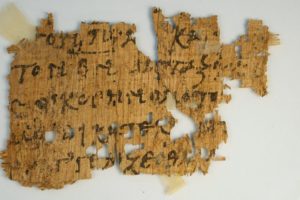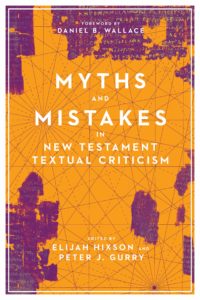Can we trust the text of the New Testament?
 One of the recent areas of apologetic contend concerns the text of the New Testament. Tin we exist confident that the texts that we have, which are then translated into our own native language, are a reliable record of the texts that were first written by the authors? Are the processes of copying and transmission trustworthy? The written report of this question, and the task of discerning the original text from the multitude of copies that we have, is known textual criticism.
One of the recent areas of apologetic contend concerns the text of the New Testament. Tin we exist confident that the texts that we have, which are then translated into our own native language, are a reliable record of the texts that were first written by the authors? Are the processes of copying and transmission trustworthy? The written report of this question, and the task of discerning the original text from the multitude of copies that we have, is known textual criticism.
Elijah Hixson and Peter Gurry have recently edited a volume looking at the key questions, Myths and Mistakes in New Testament Textual Criticism, and I interviewed Peter near the issues that they raise.
IP: Textual criticism is unremarkably viewed as being at the near specialist or 'geeky' end of biblical studies! Why exercise you think information technology is of particular importance merely at present?
PJG: This is true. It'southward probably the geekiest of the subdisciplines because it's and so technical and requires such a degree of precision. Information technology's also 'geeky' in that it'due south often seen as dry, tedious, and sometimes unnecessary. It certainly can be tedious though I think it's anything but dry out. What could be more fascinating than tracing the history, reception, and form of this text we Christians revere? As for existence unnecessary, I think textual criticism'southward importance is becoming more apparent to both lay believers and New Attestation scholars. On the lay front, the influence of Bart Ehrman on popular conceptions of the Bible has meant that pastors often have to address the subject more than earlier. When textual criticism hits the cover of Newsweek or National Geographic, you can exist certain something has shifted at the popular level.
Add together to that things like the Gospel of Jesus' Wife and the Marking fragment formerly known as Start-Century Marker and you can meet why people in the pews are taking observe. On the academic side, major research projects (like the Editio Critica Maior) and new hand editions (like NA28/UBS5 and THGNT) accept meant that scholars demand to pay more than attention to textual criticism because their disquisitional editions are changing right under their noses.
IP: You mention in your book the importance of Bart Ehrman's work. Why do you think his contribution is and so pregnant? Have there been skillful responses to it?
PJG: I recollect Ehrman hits the sweetness spot in his popular work. He brings a combination of things that scratch the itch of a secularizing society that, especially in America, is however hugely influenced by conservative Christianity. The offset is his academic credentials. He's worked and written in academia for decades and he brings a wealth of informed knowledge to questions that fifty-fifty Christians frequently don't know much about. Second, his deconversion narrative is 1 that appeals to a swath of American social club (and its media) that finds the beliefs and motives of Christians—especially evangelical ones—incredulous. Since he has "been there and washed that," he provides reassurance to atheists and skeptics that thinking people don't demand to accept Christian beliefs besides seriously (come across his interview with Sam Harris as a good case). Tertiary, he'due south always been a great communicator. He has a fashion of wearing his knowledge lightly so that listeners acquire a lot from him without feeling impaired in the process. That's very disarming for many people, I think. Finally, I recollect conspiracy narratives aimed at ability and influence entreatment to people who distrust institutions. This is one reason why information technology's easier to write a bestseller nearly the story behindwho changed the Bible and why than information technology is to write one on why those aforementioned changes don't undermine the Christian faith.
In terms of Ehrman'southward argument that textual variants disprove the Bible'south inspiration, two good responses that come up to mind are Reinventing Jesusand The Heresy of Orthodoxy. (I also similar Peter Head'south Grove booklet How the New Testament Came Together as a first port of call, but information technology's hard to get in the States. [Ed: it is available equally a PDF online]) But maybe the best response isn't actually a response at all. It's the piece of work of Ehrman's own supervisor, Bruce Metzger, whose scholarship mostly predates Ehrman'southward pop piece of work and who was convinced that textual criticism posed no real threat to historic Christians beliefs.
IP: Your book is entitled Myths and Mistakes in New Testament Textual Criticism. Amongst ordinary believers, what do you think is the well-nigh surprising affair they might find in this book?
PJG: Pictures! Besides that, they may be surprised at how much there is to learn nigh how nosotros got the New Testament text. Whether information technology'due south exploring autographs in their first-century context, understanding why some of our well-nigh important manuscripts take "extra" books in them, or learning how Bible translators in the field deal with textual variants, at that place is a lot hither for the non-expert. I learned quite a bit myself! What I most hope believers come away with is a conviction that we shouldn't appeal to bad arguments to defend the Bible—and that we don't need to.
IP: You are not afraid to take on the views of other evangelicals—and at that place are some things (for instance, the fact that autographs probably did not last for long) that some volition discover disappointing. What do you call up are the nigh common missteps that evangelicals make—sometimes in a desire to foster confidence in the reliability of the New Testament?
PJG: The most common misstep is using outdated arguments. For example, it'south extremely common to compare the large number of New Testament manuscripts to those of famous classical authors. In many cases, the classical information is even so taken from F.F. Bruce's book The New Testament Documents. That's a great volume in many means, but information technology as well wasn't updated much from its original edition in the 1940s. This means his stats for classical works are almost a century out-of-engagement now. If that wasn't bad enough, information technology gets worse considering when authors and apologists turn from Bruce'southward classical stats to the New Testament, they invariably utilize the well-nigh upward-to-date (and ofttimes biggest) number of manuscripts they tin find. The issue is a very lopsided and outdated comparison that makes the signal only does so unfairly.
Other missteps involve giving overly precise dating to our earliest manuscripts of the New Attestation, giving exaggerated manuscript counts (I've been guilty myself), and declining to think carefully about how manuscripts work when using stats about the number of variants. At that place are others, of class, and each affiliate of the book takes on one myth or fault and tries to offering a helpful cosmetic.
IP: At several points, the chapters in the volume compare approaches of the Christian community (including scribes) with broader ancient practice. Is at that place show that the Christian community took a distinctive approach to the copying and distribution of manuscripts?
In some cases, yes. We know that Christian scribes were unique in using abbreviations for certain words nosotros call nomina sacraor sacred names. This initially included words like "Male parent," "Jesus," "Christ," "God," and then expanded to include others like "David" or "Jerusalem." There is also the well-known Christian preference for the codex format (as opposed to the scroll). Scholars proceed to offer explanations for both these early on Christian phenomena, but I don't think we tin can say for sure in either instance how or why the preference arose. On the other side, at that place is plenty of evidence that Christian scribes were much like their non-Christian counterparts: they made mistakes, they tried to correct them, they cared most accuracy, and they copied the documents they did precisely because they valued them.
IP: Ehrman has made big claims about the number of variants at that place are in the NT manuscripts, and about the prove that theological concerns affected the faithful transmission of manuscripts—problems tackled by your chapter and the ane that follows by Robert D Marcello. How important are these variants for the reliability of the NT—and how many accept meaning implications for doctrine?
PJG: Yes, the irony is that his number of variants (he commonly says 200,000–400,000) is probably besides conservative. My estimate, which I based on 3 robust datasets, is closer to half a million non-spelling differences among Greek manuscripts. That'south a quite a lot and proper context is crucial to appreciate it. In John eighteen, for case, I counted over iii,000 variants among over ane,600 collated Greek manuscripts. That's again a lot, especially given that John 18 has only well-nigh 800 words in our printed Greek New Testaments. Simply when we realize that every discussion copied by a scribe comes with the potential for error and we farther call up that each of those 1,600 manuscripts required the scribe to copy about 800 words in this affiliate, the event is virtually iii,000 variants for almost 1.3 million words copied. That'southward effectually one distinct variant for every 400 words copied. Not and then bad.
More importantly, most of these variants are either insignificant to the meaning, are easily recognized as scribal mistakes, or both. The scholar's edition of the Greek New Testament (NA28) lists 154 while the translator'due south preferred edition (UBS4) lists only 10. About commentators discuss a handful of these. Of the major English language translations I checked, not one lists a single variant in the footnotes of John 18. And this is probably right since they don't warrant the attention of English Bible readers. Of course, not all variants are insignificant. There are even some that, in my view, are both difficult to resolve and occur in passages of theological or practical importance (e.g., Luke 23.34; ane Cor 14.34–35; Jude 5). Merely, since Christian doctrine at its best is based on "the whole counsel of God" (Acts 20.27) and non on isolated verses, I conclude that, while some textually debated texts do, in fact, affect doctrine and practise, no Christian doctrine or practice is in jeopardy because of textual criticism. In this, I think all tin can agree, even Ehrman.
When it comes to variants that were created for theological reasons, it's across doubt that scribes did sometimes change the text to avoid apparent problems or to "meliorate" their copies theologically. The fashion to detect this is to study a scribe'south entire work across a manuscript rather than to look at certain variants in isolation. When this is done, I find that many supposed theologically-motivated variants have more mundane explanations.
To requite an case, it's been claimed that the scribe of Codex Bezae left out the phrase "and whoever marries a divorced woman commits adultery" in Matt 5.32 because he wanted to protect men from begetting the Scarlet Letter. At present, that'southward a very spicy claim. At that place are 2 bug with this. The starting time is that, if this was his goal, he failed us men since he left the offending phrase in the text at Matt 19.ix. Second, this explanation ignores the observable trend in Codex Bezae of leaving out words and phrases by accident when like discussion endings are involved. That's exactly what we have in Matt 5.32 (μοιχευθηναι… μοιχαται) and so this is almost surely an accidental omission in Bezae. From this and like cases, I'm convinced that theological motive should exist a last resort to explicate variants. Whenever a mechanical explanation presents itself, nosotros should prefer that as more likely than theological motive.
 IP: Textual criticism feels to many like a quite technical and specialist business organisation—and the ordinary reader might experience anxious about the lack of early complete manuscripts of parts of the NT. Are there adept grounds to be confident—and is this something worth engaging in an apologetic context?
IP: Textual criticism feels to many like a quite technical and specialist business organisation—and the ordinary reader might experience anxious about the lack of early complete manuscripts of parts of the NT. Are there adept grounds to be confident—and is this something worth engaging in an apologetic context?
PJG: Yes! There is no dubiousness that Christians (and all readers) can trust the text that nosotros have as a reliable record of what the authors wrote! But I recollect the issue in textual criticism are something non only worth engaging in but, at times, necessary to. Where the authority of the Bible is challenged—whether by scholars or by pop media—Christians, and peculiarly church leaders, volition need a response. This response, to the all-time of our abilities, needs to be a responsible one and that'southward exactly why Elijah and I put this book together.
Nosotros hope it offers a resource for pastors, apologists, and laypeople to improve appreciate the robust prove we do have for the text of the New Attestation. In some cases, this ways doing the uncomfortable work of rejecting bad arguments for the Bible. Just this is done in the service of truth and with conviction that the proficient arguments nosotros have left are more than acceptable to the job. For those who do have doubts and for those who government minister to them, we hope the book is a welcome resource.
IP: Thanks very much for your time Peter.
 Peter Gurry (PhD, University of Cambridge) teaches New Testament and co-directs the Text & Catechism Establish at Phoenix Seminary. He is the writer of A Critical Examination of the Coherence-Based Genealogical Method in New Testament Textual Criticism and an editor of Myths and Mistakes in New Testament Textual Criticism. He is also a Lath Fellow member for the Institute for Biblical Inquiry and a sub-editor in text and canon for Religious Studies Review. He lives in due north Phoenix with his wife, 5 overactive children, and their true cat.
Peter Gurry (PhD, University of Cambridge) teaches New Testament and co-directs the Text & Catechism Establish at Phoenix Seminary. He is the writer of A Critical Examination of the Coherence-Based Genealogical Method in New Testament Textual Criticism and an editor of Myths and Mistakes in New Testament Textual Criticism. He is also a Lath Fellow member for the Institute for Biblical Inquiry and a sub-editor in text and canon for Religious Studies Review. He lives in due north Phoenix with his wife, 5 overactive children, and their true cat.
If y'all found this article helpful, share it on social media using the buttons on the left. Follow me on Twitter @psephizo.Similar my page on Facebook.
Much of my work is done on a freelance basis. If you take valued this post, would you considerdonating £1.xx a month to support the production of this blog?
If yous enjoyed this, do share information technology on social media (Facebook or Twitter) using the buttons on the left. Follow me on Twitter @psephizo. Similar my page on Facebook.
Much of my work is done on a freelance ground. If yous have valued this mail, y'all can make a unmarried or repeat donation through PayPal:
Comments policy: Practiced comments that engage with the content of the post, and share in respectful fence, can add together real value. Seek kickoff to sympathize, then to be understood. Make the about charitable construal of the views of others and seek to learn from their perspectives. Don't view argue equally a conflict to win; accost the argument rather than tackling the person.
Source: https://www.psephizo.com/reviews/can-we-trust-the-text-of-the-new-testament/
0 Response to "Can we trust the text of the New Testament?"
Post a Comment